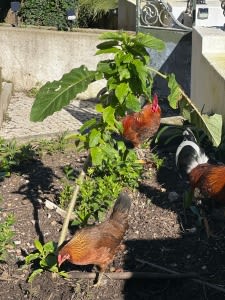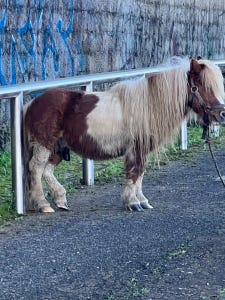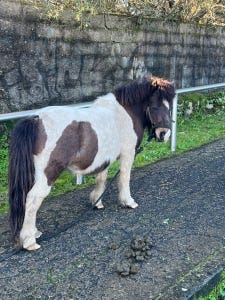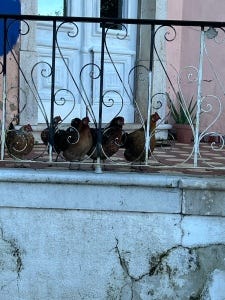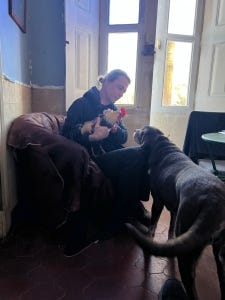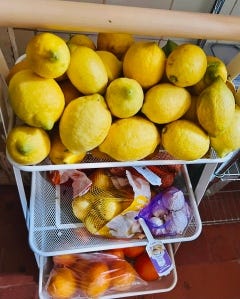Trees and Ponies
After a final week of rain, the temperature is climbing into the high sixties every day, and I am now going sans long johns under my work pants. The flowering bushes we planted in the late fall are bursting with buds; even the two trumpet flower bushes bitten by frost in their first precarious weeks after transplanting are budding.
The air is soft and pretty. It feels like spring, though it is not – in fact winter is only half over according to the Portuguese calendar which says winter months are dezembro through marco. I am not the only one fooled by a false spring; last week during a spate of warm days I noticed a hen, Carmela Baunilha, walking around the citrus orchard with a peep of nine fluffy brown chicks bubbling around her feet. I put out some food for her, and a jar for the peep, which stops the roosters from hogging all the baby food.
The weather showed rain in the forecast; we ordered a chick warmer to keep the peep warm once mama stopped keeping them under her feathery bottom. I wondered how we’d take the chicks from Carmela who was a brave little mama, pecking me warningly when I laid down the peep feed jar. Her message was clear: not too close lady. I wasn’t planning on taking the chicks until we had a way to keep them as warm as Carmela could by sitting on them. The night before the warmer arrived I awoke to lightning cracking the sky open, releasing a steady hard rain. I got out of bed and pulled on my Carhartts.
What are you doing, the h asked.
She can’t keep them warm in this weather, I’m going to get them and bring them all inside, I said. I thought a box of timothy grass in front of a space heater might do the trick.
It’s three in the morning, the h said.
I can’t leave her out there, I said. I’d never forgive myself for not trying.
Okay, he said, and put on his pants. I love this man, going out in heavy rain in the dead of night to save a hen and her chicks.
We searched by headlamp for more than half an hour, drenched, but Carmela and her peep were not in the orchard. They can’t be anywhere else, I shouted to the h over the pounding rain. The chicks are too little to make it over the concrete wall enclosing the orchard. We pulled aside weeds and looked under the trees but no hen, no chicks.
Then I found her nest, the eggs the chicks hatched from scattered widely, suggesting violence. My heart sank; the only reason the eggs were in such disarray was surely due to a predator – a rat or an owl, both of which I’d seen in the past month. We went inside, hoping against hope Carmela was somehow, some way outsmarting all of us.
In the morning I found her standing outside the back door all alone, walking back and forth along the wall making a low clucking sound I’d never heard her make. She was just below the spot where her nest had been, in the fruit orchard above our heads.
I’m sorry, mama, I told her. I sat against the wall for a bit while she looked all around me, as if she was hoping somehow, some way I’d outsmarted the rat and the owl and herself, and had her babies safe. Eventually she wandered away, and melded in with the flock at feeding time.
The chick warmer arrived later that day and we cleaned out an old rabbit hutch to act as a brooder. It’s too late to do Carmela any good but any other winter peeps will be installed promptly in the brooder hutch . Of the last 47 chicks born in this flock from October through January, not one has survived. About a dozen chicks from the summer peeps have survived to adulthood; the brooder and the coop will help us increase these odds.
We are coming up on a year of being here; we closed on the property last February, and the weather was pleasant, mostly in the mid-60s. I feel a sneaky sense I may jinx things by articulating a hope that the rest of the winter will continue to be mild, so pretend you didn’t read that.
It’s tree planting time, and we have filled the citrus orchard with orange, tangerine, lemon and lime trees plus one avocado. The upper orchard which already features two pear and a fig tree will gain a pomegranate and persimmon tree today. We planted an almond tree in the lower garden over at the Quinta.
For the past two weeks the camera (municipal) workers of Sintra have been out in force, trimming public gardens and neatening up the recycling and trash bin areas.
Bom dia! the worker in his bright yellow pants and vest greeted me on my morning walk with Jake. The smell of freshly cut greenery was everywhere.
We’ve been spending more time walking in the new town park with its well kept trails, and across the street behind a new home development where a mountain bike trail winds around for miles among abandoned windmills. Today we walked our usual loop that skirts the property and greeted many dogs and owners like old friends. A golden retriever puppy put its soft fuzzy face in my hand; a tiny little Yorkie boldly approached Jake and chose to sniff him just as Jake lifted his leg. The Yorkie’s owner tried to tug the little guy away from Jake’s big dog stream. Tu nao quer um chuveiro amarelho, I said, attempting my first joke in Portuguese. The owner looked at me in surprise and burst out laughing. I went home and looked up the translation and was very proud to see I did in fact tell the little Yorkie, You don’t want a yellow shower.
Jake and I headed down the public walkway near the eastern edge of our property and suddenly Jake stopped. I followed his gaze and there in a small pasture near our property line a horse was grazing. It lifted its head and watched us with mild eyes before returning to its cropping. What is it about horses that is so magical, I wonder. Like dolphins, the sight of them always brings a smile.
Further down the walk we encountered two more cavalos – two ponies, one a shaggy Shetland, both tethered loosely by long ropes to the handrail. There was plenty of laxity in the rope to graze in the campo next to the walkway but they stood stolidly in the middle of the walk. They watched us with unblinking interest as we passed, Jake sniffing admiringly at the pony patties piled hither and yon. I pulled him away before he could sample one.
Today when it was time to feed the flock about a dozen clustered around my legs, tripping me as I walked up the chicken coop. To date only half the flock has eaten at the coop with any regularity; the rest come running from their perches on the front porch and backyard where they roost in the shade, looking at me anxiously as if to say, Why aren’t you feeding us? Don’t you love us? They’ll learn, our neighbor Alberto assured me.
After a few weeks of chaos it appears they have indeed begun to get the gist; today as I mounted the steps to the pool house – which is the pathway to the coop – another dozen chickens streamed out of the chicken coop courtyard. They gathered at my feet in a clear communique: We’ve been waiting for you! About two thirds of the flock are taking their feed at the coop now.
I lay the food down in long rows, using roof tiles as makeshift feeders. This allows them to eat side by side while reducing squabbling caused mostly by the older roosters intent on maintaining a pecking order.
Two young roosters – Alohonse and Potsy – regularly stand on my shoes, stretching their necks to be picked up and receive a hand feeding. They are quite comfortable walking around the house, so I guess now we have house roosters. Jake is a little jealous.
I gathered our first egg, a beautiful medium sized cream color – I think Goldie Hawn laid it, or possibly Betty White.
Alberto just arrived bearing orchids and cabbages to plant, plus cabbage and a bag of wild spinach to eat and another armload of lemons. Looks like we will be making lemonade for the foreseeable future.


